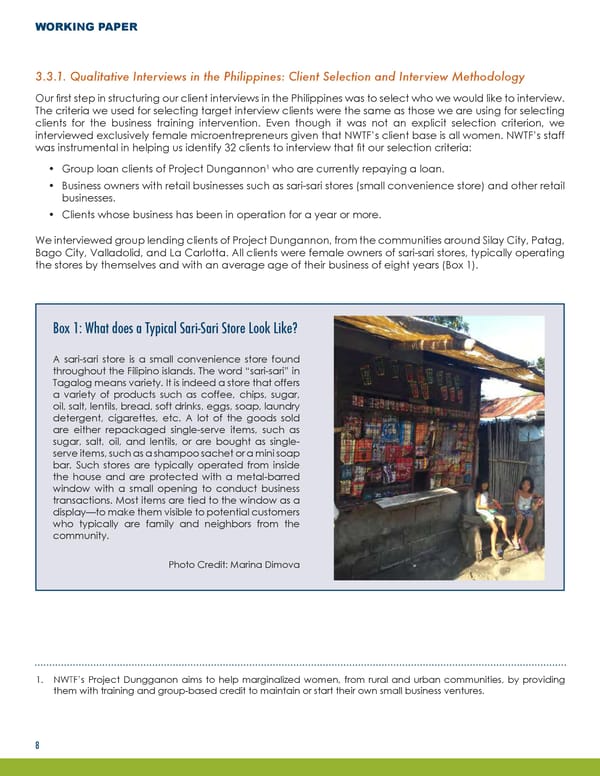WORKING PAPER 3.3.1. Qualitative Interviews in the Philippines: Client Selection and Interview Methodology Our first step in structuring our client interviews in the Philippines was to select who we would like to interview. The criteria we used for selecting target interview clients were the same as those we are using for selecting clients for the business training intervention. Even though it was not an explicit selection criterion, we interviewed exclusively female microentrepreneurs given that NWTF’s client base is all women. NWTF’s staff was instrumental in helping us identify 32 clients to interview that fit our selection criteria: 1 • Group loan clients of Project Dungannon who are currently repaying a loan. • Business owners with retail businesses such as sari-sari stores (small convenience store) and other retail businesses. • Clients whose business has been in operation for a year or more. We interviewed group lending clients of Project Dungannon, from the communities around Silay City, Patag, Bago City, Valladolid, and La Carlotta. All clients were female owners of sari-sari stores, typically operating the stores by themselves and with an average age of their business of eight years (Box 1). Box 1: What does a Typical Sari-Sari Store Look Like? A sari-sari store is a small convenience store found throughout the Filipino islands. The word “sari-sari” in Tagalog means variety. It is indeed a store that offers a variety of products such as coffee, chips, sugar, oil, salt, lentils, bread, soft drinks, eggs, soap, laundry detergent, cigarettes, etc. A lot of the goods sold are either repackaged single-serve items, such as sugar, salt, oil, and lentils, or are bought as single- serve items, such as a shampoo sachet or a mini soap bar. Such stores are typically operated from inside the house and are protected with a metal-barred window with a small opening to conduct business transactions. Most items are tied to the window as a display—to make them visible to potential customers who typically are family and neighbors from the community. Photo Credit: Marina Dimova 1. NWTF’s Project Dungganon aims to help marginalized women, from rural and urban communities, by providing them with training and group-based credit to maintain or start their own small business ventures. 8
 Using Behavioral Science to Design a Customer-Centric Financial Management Training for Microentrepreneurs Page 10 Page 12
Using Behavioral Science to Design a Customer-Centric Financial Management Training for Microentrepreneurs Page 10 Page 12